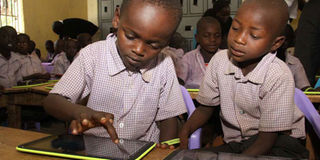Time for Africa to realise her dream is now

Standard One pupils at Ortum Boys Boarding Primary School in West Pokot County use their tablets during the launch of the Digital Literacy Programme on September 30, 2016. There is a lot of optimism about the return of the Africa rising sentiment. FILE PHOTO | JARED NYATAYA | NATION MEDIA GROUP
What you need to know:
- Africa can only progress when leaders elected into public office are held accountable by the people who elected them.
- It is equally important to ensure institutions are set up or reinforced and become completely independent to maintain checks and balances.
Let me start by noting that every new beginning generates hope for significant new opportunities in all spheres of life. This year is a very promising one for Africa. Following the various momentous events and achievements in 2018, from the encouraging signs of recovery in economic growth to restoration of a more peaceful environment in many parts of the continent, especially in the Horn of Africa, quite a few successful democratic transitions through the ballot box to the launching of innovative initiatives for youth empowerment, to more successes in the promotion of gender equity, better management of migration issues and the launch of the African continental free trade area, a lot is expected from the stakeholders in the various sectors, both private and public. Coming on the heels of all these positive developments, 2019 could turn out to be a great year for the continent. There is a lot of optimism about the return of the Africa rising sentiment.
Africa can only progress when leaders elected into public office are held accountable by the people who elected them. It is equally important to ensure institutions are set up or reinforced and become completely independent to maintain checks and balances. Africa’s sustainable growth and development will also be guaranteed when the recurring cycles of instability and conflicts are definitively stopped. Furthermore, there is a need to put an end to the seemingly unending humanitarian crises and annual appeals for humanitarian assistance as the continent has the potential to be self-sufficient in food production and even in emergencies. Africans deserve better health, sanitation and educational services, as these are also key factors for inclusive development, transformation and stability.
The key drivers for powering growth and economic development in Africa in 2019 should continue to be transformational initiatives in all sectors, accelerated infrastructure development and dynamic entrepreneurship as well as linking them to efforts aimed at attainment of SDGs. There is, therefore, a need to nurture developmental states in Africa and reinforce their capacities for strategic planning and implementation.
SOCIAL INCLUSION
It is, therefore, encouraging that visible progress is being realised, though, uneven across the continent. Some countries are beginning to perform much better as a result of economic diversification, revitalisation of education and health sectors, skills development, youth empowerment, gender equality and social inclusion.
UNDP is set to support African countries even more in fostering inclusive transformation and development, crisis resolution and prevention, making progress towards the SDGs, entrenching of genuine democratic governance, better leveraging of the demographic dividend as well as more effective responses to climate change and the big energy gap.
We are already witnessing some historic developments, including the just-ended elections in the Democratic Republic of Congo (DRC), coming on the heels of earlier successes in democratic transitions in countries such as Liberia, Sierra Leone, Madagascar, etc in the course of 2018. UNDP has an important role in helping the consolidation of these successes through its good governance programmes.
The Next Generation UNDP will continue to work in even smarter and more innovative ways in the support provided to African countries towards the realisation of a more peaceful, prosperous and transformed continent.
The writer is Director, UNDP Regional Service Centre for Africa




